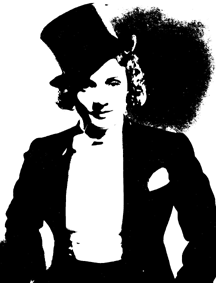 Fiat Tux: Marlene Dietrich gave '30s moviegoers something to think about when she dressed up like a man and kissed a woman in "Morocco."
Tinsel Town stereotypes are exposed in 'The Celluloid Closet'
By Richard von Busack
The documentary The Celluloid Closet is just as essential to the serious student of social history as the late Vito Russo's book is to the shelf of the serious movie fan. The documentary is, if anything, more damning, since it shows, instead of describes, how the movies have portrayed gay people as jokes or monsters virtually since its beginning.
Through film clips and interviews, The Celluloid Closet builds to a montage of different films of the late 1950s and early 1960s, when the cinema industry was steeling itself to admit that the perverts walked among us.
Interviewee Gore Vidal is so tongue-blunted by the memory that he can say only, "I've never seen such a time for censorship." The illustrative sequence introduces scenes of the violent deaths of gays and lesbians in Walk on the Wild Side, Advise & Consent and The Children's Hour (all 1962), Rebel Without a Cause (1955) and, holding it all together, the long maniacal punch line to Suddenly Last Summer (1959), in which the queer Sebastian Venable is (good Lord, choke!) eaten alive by a pack of street urchins. It's possible to chuckle at the wretched excesses of the individual scenes--and Suddenly Last Summer was written by the gay Tennessee Williams and the not primarily heterosexual Vidal--but seeing them all together is a disturbing and infuriating experience.
Before gay people were considered a threat, the movies preferred "sissy" caricatures. In those days, it could be playfully suggested that Laurel and Hardy were more than just friends, and musicals and society comedies used the gay man and woman as a joke to make the audience feel sophisticated. In some ways, the sissies were as obnoxious as any other caricature, but many fans of '30s musicals enjoy without contempt the effeteness of such reliable comics as Franklin Pangborn, Erik Rhodes and Edward Everett Horton.
Censorship in the mid-'30s made sure that men were men and women were women until the '50s; avoiding homosexuals and lesbians, you got more wholesome entertainment like, say, Rock Hudson and Doris Day. A showstopper in The Celluloid Closet gives us Day in drag in Calamity Jane singing, "My secret love's no secret anymore." As Quentin Crisp observes, "A man in drag is a joke, but a woman in drag gives pause," and Marlene Dietrich's lovely teasing kiss of a woman in Morocco is a moment that's given audiences something to think about ever since.
In the late '50s, Hollywood was ready to handle the subject of gayness--first with a pair of tongs, and second with a hammer. It was then (until now) that screen homosexuals and lesbians became primarily murderers and suicides.
Vidal lightens the discussion as he recalls the fine trick he played on Charlton Heston, writing Ben-Hur's estranged friend Messala as an estranged lover. Vidal also scripted the famous "snails and oysters" scene from Spartacus, in which Tony Curtis plays a Greek slave fending off the advances of Roman slave master Laurence Olivier.
Curtis is as justly proud of his ultimately censored scene with Olivier as he is of his more famous part as "Josephine" in Some Like It Hot. "We're all of us born half man and half woman," Curtis says, taking the New Ageiness out of the remark by his subsequent wisecrack that Olivier's character probably should have taken his new slave out to dinner first before making a pass at him.
Compare Curtis' ease with the reactionary fury of Kirk Douglas telling Lauren Bacall, playing Douglas' bisexual wife in Young Man With a Horn (1950), that she's sick; though the precise scene from Basic Instinct isn't in The Celluloid Closet, it's easy to fast-forward to son Michael insulting Sharon Stone for her bisexuality.
There's no room for self-congratulation in the film industry. Now, as then, a gay audience still takes what it can get, putting up with writers like some of the ones interviewed here: Barry Sandler, for instance, who wrote the gay-positive but astoundingly bad Making Love. Tom Hanks' laudable willingness (or enviable clout) to play a gay hero in Philadelphia is worth noting. Still, director Jan Oxenberg observing it all, comments, "It remains to be seen whether an audience will accept a gay hero who lives."
[ Metro Santa Cruz | SantaCruz Home | Archives ] | ||||||||||||||||||||||||||||||
This page was designed and created by the Boulevards team.
Copyright © 1996 Metro Publishing and Virtual Valley, Inc.
